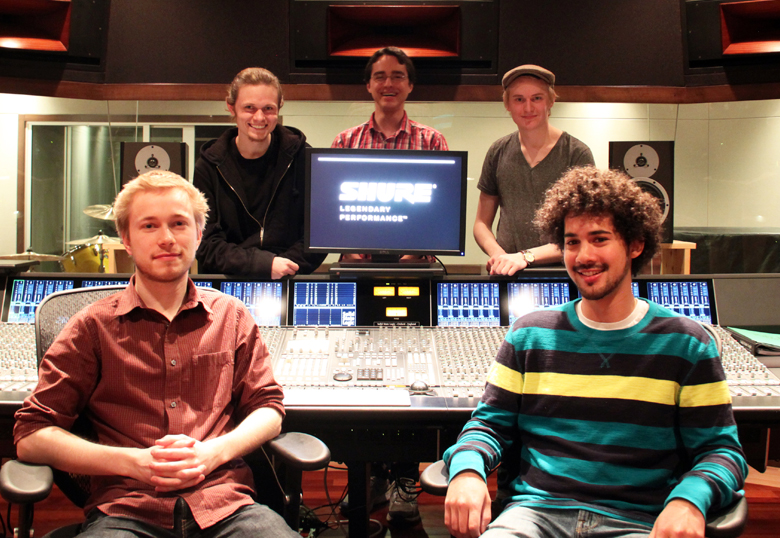The University of Lethbridge‘s expert team of digital audio arts majors has taken the Runner Up prize in the 10th annual Shure Fantastic 10 Scholastic Recording Competition - the first year that the American competition has been open to Canadian schools. The U of L Shure Recording Team, as the group called themselves, won more than $7,200 worth of Shure microphones and headphones for the University, and individual team members also received Shure microphones and headphones.

“We were thrilled to have been selected as one of only 10 schools in Canada and the United States to compete,” says Thilo Schaller, music faculty supervisor. “I am very proud of our team. They put their hearts and souls into this project and deserve the award.”
For the last 10 years, Shure Inc., an audio products corporation, has worked with audio education departments at universities across the United States, and this year Canada, to find tomorrow’s talented engineers. The schools were selected randomly from those who applied to compete. The U of L Shure Recording Team was also selected randomly from digital audio arts majors who expressed an interest in being involved. Team members were Jamison Humeny, Jake Hills, Sam Walker-Kierluk, Shae Brossard and Nicholas Goodman.
The other nine participating schools were: Berklee College of Music, Daytona State College, Ithaca College, Lamont School of Music (University of Denver), MacEwan University, The Hartt School (University of Hartford), University of Central Missouri, University of Colorado Denver, and Tennessee State University, which took the grand prize.
The challenge was to create a recording by tracking and mixing the performance of an original piece of music exclusively using Shure microphones, which Shure provided on a loan basis.
“This challenge opened up the opportunity to our entire music program as digital audio arts students needed to find an original composition to record,” says Schaller.
The composition the team recorded was created by music major Nicholas Zambon, who sang his original song Don’t Let Me Go as well as played acoustic guitar and bass. Other student musicians participating included Jacob Hills (electric guitar), Joe Porter (drum kit, pandeiro, concert bass drum, cymbals), Nicholas Goodman (bass), Michael Ayotte (piano, organ) and Riane McCallum (backup vocals).
The entire process, which ran from October 2013 through the end of April 2014, was tracked by the team using photos and videos. The complete documentation of the process was reported to Shure on milestone dates throughout the year. The final stereo mix was reviewed by a jury of independent engineers and producers selected by Shure. Watching one of the videos the U of L team posted on Shure’s competition blog, it is clear to see that their recording strategies ranged from capturing natural sounds to taking full advantage of the ubiquitous concrete structures on campus by creating interesting reverb tracks using stairwells, a drama studio and the tunnel. They also took full advantage of the top quality equipment in Studio 1.
“We are all pretty proud of what we accomplished. The song sounds great, we all did our best and it paid off,” says Jake Hills. “As for competing against everyone else, I didn't really think about it. We just wanted to make the best sounding recording we could.”
The competition provided an invaluable learning experience for the digital audio arts students.
“Being involved in this competition really helped develop our teamwork and communication skills, and having the chance to work with new, state-of-the-art equipment on the project can only benefit our careers in the world of audio production,” says Sam Walker-Kierluk.
Schaller adds, “To do so well in our first recording competition reflects well upon our digital audio arts major and the bachelor of music program at the University of Lethbridge. The art of recording is just one of many areas of study in our DAA program and taking the Runner Up prize clearly indicates our students’ skills in the recording studio are just as strong as those of students in programs that primarily focus on recording. It was great to see students apply their knowledge of acoustics, their creative audio engineering, and critical listening skills to this project.”
